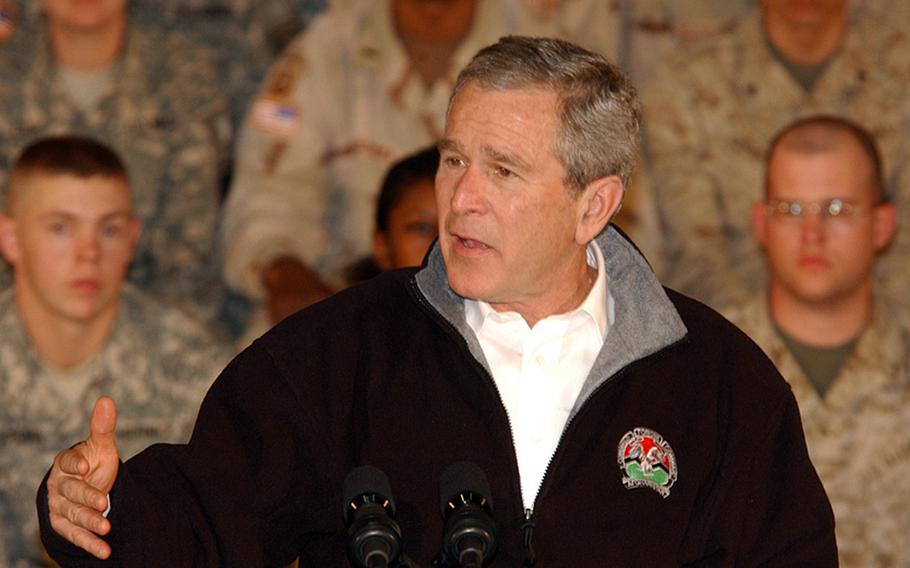
President George W. Bush speaks to a crowd of troops during a surprise visit to Bagram Airfield, Afghanistan, March 1, 2006. Bush thanked the troops for their service and assured them they are making strides towards democracy in Afghanistan. (Brian Schroeder/U.S. Army)
Former president George W. Bush said he believes the withdrawal of U.S. troops from Afghanistan is a mistake, in rare public remarks on the military intervention he launched nearly two decades ago.
In an interview with German international broadcaster Deutsche Welle that was posted online Wednesday, Bush said he is "afraid Afghan women and girls are going to suffer unspeakable harm" because of the withdrawal.
"You know, I think it is," Bush said when asked whether he thinks the withdrawal is a mistake. "Yeah, because I think the consequences are going to be unbelievably bad. And I'm sad. Laura and I spent a lot of time with Afghan women. And they're scared."
President Joe Biden announced earlier this year that he is ending the U.S. military's mission begun in the aftermath of the Sept. 11, 2001, terrorist attacks, leaving behind a force of about 600 troops to protect the U.S. Embassy and the international airport a few miles away. Biden has said that the withdrawal will end formally on Aug. 31, but effectively it is complete now, with Monday's departure of the top U.S. commander in Afghanistan, Army Gen. Austin "Scott" Miller, according to defense officials.
The United States has spent nearly a trillion dollars on Afghanistan since 2001, funding the war, propping up the country's government, building a military and financing infrastructure projects, according to Pentagon reports. U.S. airstrikes were instrumental in driving the radical Islamic Taliban regime from power in Kabul in November 2001 after five years of brutal rule.
Many Afghan women have seen the presence of U.S. forces in Afghanistan as protective. Under Taliban rule, women were not allowed to work, attend school or travel outside the home without a male guardian. When in public, they were required to wear the burqa, a head-to-toe covering with a small mesh window to see through.
In most Taliban-controlled areas of Afghanistan today, women remain largely absent from public life and still face the same restrictions on dress, but girls are allowed to attend school, and women are allowed to work in certain fields such as medicine and education.
In the Deutsche Welle interview, which was taped as part of a documentary on German Chancellor Angela Merkel, Bush also said he worries about others in Afghanistan who assisted U.S. and NATO forces over the past 20 years.
"I think about all the interpreters and people that helped — not only U.S. troops, but NATO troops — and they're just, it seems like they're just going to be left behind to be slaughtered by these very brutal people," Bush said. "And it breaks my heart."
"I'm sure Angela — I haven't talked to her about it — but I suspect she feels the same way," Bush added. "After all, she was a little girl who grew up in a pretty closed society."
In remarks this month, Biden pledged to relocate thousands of Afghan interpreters who served alongside U.S. troops and now fear for their lives and the safety of their families, adding that some relocation flights would begin as early as this month.
Critics have warned against abandoning interpreters and other Afghans who helped the American war effort, and Biden told them last week that "there is a home for you in the United States if you so choose." But his administration has released few details.
While Bush voiced criticism of the withdrawal, some former members of his administration have argued that the decision to leave is overdue.
"I wouldn't say enough is enough," retired Gen. Colin Powell, who led Bush's State Department during the 9/11 attacks and the beginning of the U.S. war in Afghanistan, said in April. "I'd say we've done all we can do. ... What are those troops being told they're there for? It's time to bring it to an end."
A poll taken shortly after Biden announced the pullout showed it to be fairly popular. In a Quinnipiac University survey in late May, 62% of Americans said they approved, while 29% disapproved and 9% offered no opinion.
The Washington Post's Susannah George, Dan Lamothe and Cleve R. Wootson Jr. contributed to this report.